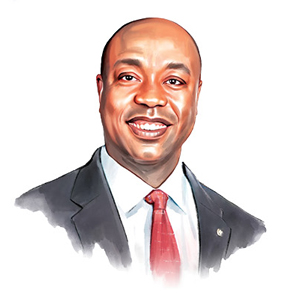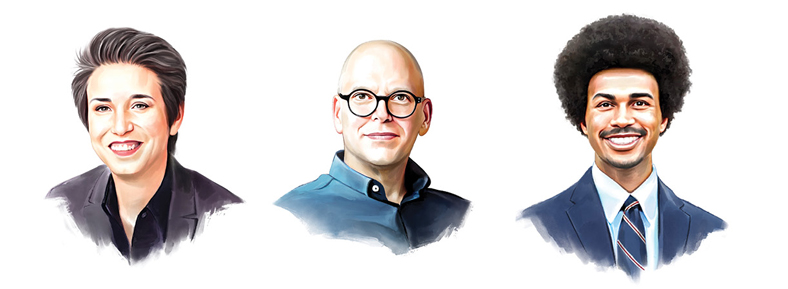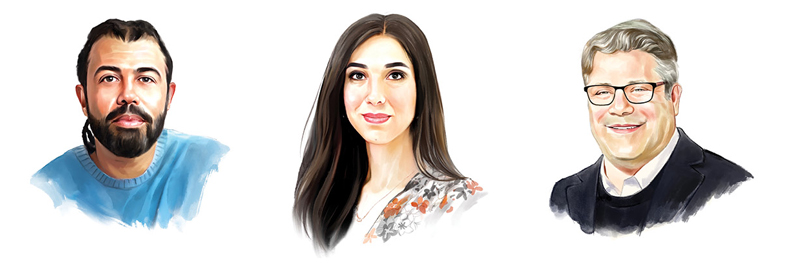
Senator Tim Scott
April 2
US Senator Tim Scott (R-SC), who long ago found his home in the Republican party, said partisan politics won’t lead to solutions to the country’s biggest problems.
During an event on Capitol Hill hosted by AU’s Sine Institute of Policy and Politics, the 2024 presidential candidate told Sine fellow and former AU president Sylvia Burwell that lawmakers must bring an open mind to policy discussions.
“I’ve learned that the more agnostic I am about problems and solutions, the more likely I am to find interesting answers with people who vehemently disagree with me,” said Scott, chair of the National Republican Senatorial Committee. When people dismiss those who disagree with them, “sometimes you miss the golden opportunity of living in the most diverse country on the planet. Our diversity is our greatest strength, and if we understand that, then we understand the power of being able to disagree without being disagreeable. If we could ever embrace that notion, we will solve more problems faster than ever imagined.
“I hope that your generation is the generation that decides to take that on as a project for America’s future,” said Scott to the AU students in the audience on the ninth floor of the Hart Senate Office Building, which offers a sweeping view of the Federal City.
Scott’s hourlong conversation with Burwell—the final seminar in her series From Dolly Parton to Shaboozey: Is the 9 to 5 Still Working?—centered on the possibility of political and cultural realignment in the US.
Throughout his career, Scott has worked with lawmakers across the aisle, he said. Scott partnered with US Senator Chris Coons (D-DE) to support historically Black colleges and universities and with US Senator Cory Booker (D-NJ) on bipartisan police reform.
“Here’s what it takes to be successful and make progress: Do not care who gets the credit,” Scott said. “Figure out what people really need. Find someone who agrees with the need and most of the solution. Fight behind closed doors on the rest of the solution and bring it all to [the] table. You’ll have more legislative victories and more people in this country who will … celebrate the opportunities that they have been afforded because you did the right thing.”
Scott also took questions from AU students about tariffs; the economy; Booker’s record-breaking 25-hour speech on the Senate floor the day before; and how federal policies could increase home ownership—particularly among the generation now entering the workforce.
He said the homeownership issue is an example of a problem ripe for nonpartisan cooperation: “Republicans and Democrats, progressives and conservatives, are coming together on the issue of homeownership because we all see in our own communities that this is not a Republican issue. It’s not a Democratic issue. It’s not a Black issue. It’s not a white issue. It’s a crisis in our country.”

Amy Walter
March 6
“When we talk about the haves and have-nots, so much is driven by this idea that there is a group of people who are getting ahead and who will keep getting ahead, while another group does not see a path for their own future. That divide—driven in part by changes in our economy and changes in the importance of getting [college] degrees—has benefitted one group of people and not another.”
The publisher and editor in chief of The Cook Political Report joined former AU president Sylvia Burwell—a fellow with the Sine Institute of Policy and Politics—for a conversation about whether the 2024 presidential election marked a political realignment in the US.
Jim Obergefell
December 5
“We have to keep sharing these stories and reminding people just how important marriage is and what our families look like. There’s a generation that’s now grown up [for whom] marriage has always been an option. But it hasn’t always been that way.”
The lead plaintiff in the historic 2015 Supreme Court decision that legalized same-sex marriage reflected on the power of personal narratives to “change hearts and minds” during an American Forum event moderated by SOC professor Jane Hall.
State Representative Justin Pearson
February 13
“You can’t expel a movement.”
The second-youngest lawmaker in the Tennessee House of Representatives was removed from his position after staging a protest for gun legislation on the chamber floor following a mass shooting in Nashville in March 2023. The Democrat—who was reappointed six days later—visited AU during Black History Month, chatting with students about community organizing and why “serving and being of service is the best thing you can do in your life.”

Daveed Diggs
February 18
“I don’t remember ever thinking that art and activism were separate things.”
The Tony Award-nominated actor—who starred as Thomas Jefferson and the Marquis de Lafayette in Hamilton—headlined AU’s second annual Spirit of Change Week. Diggs talked with SIS professor Omékongo Dibinga about his childhood in Oakland, California, birthplace of the Black Panthers, and how his African American and Jewish identities have shaped his worldview.
Nadia Murad, CAS/BA ’24
February 6
“We were just viewed as spoils of war.”
The Sine Institute fellow was among 6,500 women and children who were taken into sexual slavery when ISIS raided their village in northern Iraq in August 2014. The Nobel laureate and president of Nadia’s Initiative, which works to bring perpetrators of conflict-related sexual violence to justice, shared her story with the AU community as part of her seminar series Activism and Accountability.
Sean Astin, SPA/MPAP ’24
December 15
“I know something about fellowship and determination because I was privileged to travel across Middle-earth, vanquish evil, and catch a ride home on an eagle.”
The actor, known for his roles in the Lord of the Rings trilogy, The Goonies, Rudy, and Stranger Things, lauded his fellow graduates for their hard work during AU’s 148th commencement. Astin earned an online master’s in public administration and policy.